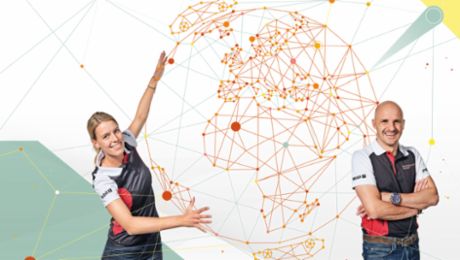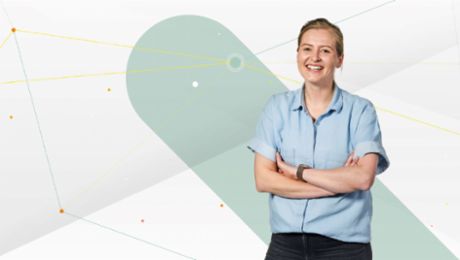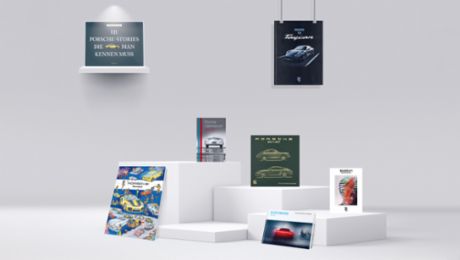Hardly anyone is apt to reminisce fondly about the acute stage of the coronavirus crisis. Yet Thorsten Heuberger speaks with enthusiasm about that “stressful but incredibly creative time, when new things kept happening every day.” He’s not referring to the crisis itself, of course, but rather to what it meant for his work and that of his colleague Oliver Scheible. In a very short period of time, Thorsten, Oliver, and their team developed an internal Porsche chatbot that could provide information and answer employees’ questions about the pandemic around the clock. The abrupt shift to working from home and the temporary stop in production led to one thing above all else: a lot of open questions. The phones at the personnel and health management departments were ringing nonstop. A solution was needed quickly.
To launch the Porsche Employee Assistant—as the chatbot is still officially called—within a few weeks was a huge job, says Thorsten, who is responsible for the bot’s technology. Although the team had already been working on an in-house company bot before the pandemic broke out, no one thought it would go live so quickly without a safety net or fallback. “The coronavirus crisis definitely made us rev up our development work,” says Oliver, the product owner of the bot project.
“The coronavirus crisis definitely made us rev up our development work.” Oliver Scheible
The team had only come together in late 2019 as part of the AI@Porsche program (see p. 26). Its task was to develop a chatbot that would use artificial intelligence to answer employee questions in many different areas of the company. It takes many hours of programming, testing, and improving, and then testing and improving again, for an AI system to give the right answers to questions formulated in all kinds of different ways. Hours that the Porsche developers did not have in this case. “At the end of February, it was clear that the coronavirus would be affecting us more than we had thought. In mid-March the employees were advised to work from home, and we released the bot just three weeks after that,” says Thorsten. It’s no wonder the AI system spit out the occasional wrong answer at first. “We were focusing on possible questions related to the virus and how the company was changing its office hours and locations and so on,” says Oliver. But the bot was not prepared for a question about when it was born. “Your maternity leave starts on October 12,” was what it came up with, an answer triggered by the keyword “born.”
Overall, however, the numbers show that the “crisis chatbot” was and is a complete success. One measure is the quality of its answers. The AI system has been able to answer 98.3 percent of the questions correctly, and been stymied by only 1.7 percent. Another measure is its reception by the Porsche employees. More than 20,000 users have registered with it and submitted more than 30,000 queries. “That level of use is high praise for our work,” observes Thorsten. But the team is even happier about the fact that their achievement has significantly lessened the load for their colleagues in the health management and personnel departments. “It’s great that we can help our coworkers, because that’s the whole point of the bot,” says Oliver.
“That level of use is high praise for our work.” Thorsten Heuberger
Although the bot can now answer all questions related to the coronavirus, the team’s work is by no means over. Other departments are also extremely interested in having the AI system learn to handle their own content. At the same time, the bot team continues to refine the personality of their digital coworker. In keeping with the four key values at Porsche – a pioneering spirit, dedication, athleticism, and a sense of family – ist answers should be as fresh, lively, and friendly as possible. And it should have a name, which the employees will soon be voting on.
Thorsten and Oliver have visions for further down the road in the future as well. “At some point, the bot could be like a virtual personal assistant for every employee. It could tell them how much vacation they have left, for example, and then if asked, it could directly access an application form for taking days off,” explains Oliver. But that is still a while off – unless another unforeseen event with worldwide repercussions once again lends wings to the development process.
What is a (chat-)bot?
A bot is a computer program that deals automatically with repetitive tasks without thereby depending on a human operator. A chatbot analyzes user input to provide answers that draw on routines and rules.
Thorsten Heuberger

Title: Senior IT-Architect
Job: Chatbot tech lead
Born: 1986
At Porsche since: 06/2018
Al principle: "Artificial intelligence is a supplement, not a replacement.”
Superpower: Openness to risk
Oliver Scheible

Title: IT-Plattform Manager
Job: Chatbot Product Owner
Born: 1976
At Porsche since: 10/2014
Al principle: “AI is when automated processes give you more time to do essential activities.”
Superpower: Losing no one along the way, thanks to integrator skills
Simone Schulz

Title: Program Manager
Job: Al@Porsche chief product owner
Born: 1970
At Porsche since: 10/2017
Al principle: "The relation between human and artificial intelligence will be so smooth someday that -decisions will be made in real time.”
Superpower: Transforming the human/machine interface
Daniel Bareiss

Title: Innovation Manager
Job: AI@Porsche funnel managment
Born: 1990
At Porsche since: 01/2019
Al principle: "One of the dangers of artificial intelligence is thinking we already totally understand it.”
Superpower: Mastering chaos
Interview
“We want more than 35,000 people on board”
The AI@Porsche program was founded as a clearinghouse for all AI activities within the Porsche Group. The goal is to use artificial intelligence to optimize company processes—and especially to inspire and expand the horizons of fellow employees.
Simone Schulz, Daniel Bareiss, what was the reason for starting AI@Porsche?
Simone Schulz: Artificial intelligence is nothing entirely new for Porsche, of course. But different individuals were working on it in many parts of the company, and there were very different levels of knowledge about what exactly AI is and how it can benefit not only the company but also all of us individually. Our program is like a clearinghouse for all AI activities within the Group. We keep an eye on everything, standardize processes, and decide which AI solutions should be promoted faster than others – for the moment, we’re only talking about internal projects.
Daniel Bareiss: Many people learn about artificial intelligence from movies like Star Wars or Terminator – and think it’s mostly put to nefarious use. Our aim is to show our colleagues how AI can help them in their everyday work. We want to get more than 35,000 Porsche employees on board and convey the fundamentals of AI in seminars. We’re also training some of our colleagues with the right professional backgrounds to become experts themselves.
What has happened since the program started in 2019?
Bareiss: 2019 was the year we defined our mission and made ourselves known. We set up a core team of about ten people, contacted all the departments to tell them we’re here and what kind of added value we offer. We also looked for influencers, and together with them we’ve compiled around 250 potential use cases on how artificial intelligence can improve our company processes. Since then, there have been a lot of internal and external events like AI Monday, which we help to organize.
Schulz: 2020 is the year we’ve started to see results. We validated and prioritized the 250 use cases, and started putting some of them into practice. This year we want to put about twenty AI applications of very different types into action.
Did the coronavirus really slow down your work?
Bareiss: No, we’re well within schedule. Working from home has only meant delays for what we call “people business.” Virtual workshops are simply not the same as real ones.
Schulz: The coronavirus itself, however, became a use case that let us demonstrate what we can do. The “crisis chatbot” shows that we can put projects quickly and successfully into practice if called upon. And the bot, of course, is a great example of how artificial intelligence can be of value to employees.
AI Monday
AI Monday was launched in 2017 by a company in Helsinki as a networking event on artificial intelligence. Germany’s first AI Monday was held in Berlin in 2018. A similar format was launched in Stuttgart in 2019. Porsche organizes the events as a partner of the Finnish initiators.
Because of the Covid-19 pandemic, this year’s event in Stuttgart on July 20 was held online. Find out more: www.ai-monday.de/stuttgart
Three examples for AI@Porsche
Further training à la Netflix
If you make regular use of video-streaming services like Netflix, you know that watching just a few series or movies will give the algorithm an idea of your interests and it will suggest similar titles. This principle of “here’s something you might also like” will be used on the learning platform for Porsche employees. In the past, it has been difficult to find the right training modules from among the large number on offer. In the future, employees will receive messages like: “Now that you’ve completed the ‘Agile work’ module, we also recommend the unit on ‘Artificial intelligence.’”
Pleasant temperature right from the start
Every Saturday at 11 am, Frank Schuster drives his daughter to her riding lesson. His Taycan in the garage knows that. It also knows if the weather outside is freezing cold or beastly hot. In order for father and daughter to enjoy their drive right from the start – whether in the depth of winter or the height of summer – the sports car asks its owner about thirty-five minutes beforehand if it should preheat or precool the interior to the usual pleasant temperature. Schuster has already used artificial intelligence to preprogram that value. This AI solution was introduced in early 2020 for all Taycans and Cayenne Plug-in Hybrids as well as Cayennes with auxiliary heating.
KATE knows when the new Porsche is coming
The company can tell the precise day when a customer’s individually configured Porsche will roll from the factory production line. But it’s more difficult to estimate when a sports car will arrive at a particular dealership – especially if the car has to be shipped to another continent. Here, too, artificial intelligence will soon be of assistance. Using data from the past, KATE – a new delivery calculation service that stands for “customer order completion engine” (Kunden-Auftrags-Terminierungs-Engine) – can make a prediction. The aim is to be able to narrow the delivery date down to the week.
Info
Text: Julia Bayer
Text first published in CAMPUS Magazine.




